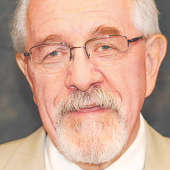- Christmas shopping is done, presents wrapped, strings attached? (12/14/16)
- Cecil is dead and human lives are threatened every day (8/12/15)
- As state flags go, Nebraska's ranks 50th (7/8/15)
- When everything looks like a nail (4/29/15)
- Who remembers to coal slurry pipeline debate? (3/11/15)
- More revelations in Department of Corrections mess (12/17/14)
- The Legislature becomes more Republican (11/19/14)
Opinion
Will tax on soft drinks help curb obesity?
Wednesday, March 20, 2013
In a state where farmers feed corn to cattle to fatten them for market, a senator wants to tax drinks -- many of which feature corn syrup sweetener -- as a way to curb obesity.
State Sen. Bill Avery of Lincoln says his bill (LB447) being heard by the Revenue Committee is aimed at soft drinks, which have no nutritional value. He said the current exemption for soda pop is indefensible because the drinks don't belong in the same tax-exempt category as food. A similar bill filed last year never made it out of committee.
On one side, many nutritionists say soda consumption contributes to obesity. Others say that even so-called diet soft drinks are unhealthy because artificial sweeteners metabolize as deadly chemicals that injure the body. At least one brand of soft drink has a vegetable oil that is banned in Europe.
Avery says that ending the sales tax exemption would bring the state an estimated $11 million in new sales tax revenue. Of that money, 70 percent would be used for school wellness programs and data collection on student obesity and exercise and 30 percent would go to local health departments for health-related programs.
Opponents say the measure is just an unfair way to raise revenue for a new state program by singling out the beverage industry. One Revenue Committee member wonders if this would open the door to selecting even more previously exempted food items and further diminishing that tax-exempt status. Many say that drinking pop is just one piece of the problem. Lack of exercise, poor diet, family history and overeating should also share the blame.
It has been argued for years that taxing food would place an unfair burden on those who can least afford it -- the poor. Governor Dave Heineman is unlikely to support what he sees as a new tax. He frequently cautions against creating programs that would increase taxes, even though Avery and other proponents say that spending the proceeds on wellness programs and data collection would benefit higher education and local health departments.
Dr. Bob Rauner, a leader in a coalition of Nebraska physicians, nurses, teachers and health organizations that is supporting Avery's effort, acknowledges that obesity has many causes. But he thinks that reducing consumption of soft drinks and other sugary beverages -- perhaps by raising the price through taxes -- could cut into the obesity problem and help reduce the gluttony of spending on diseases caused by the drinks.
A spokesman for the American Beverage Association says it boils down to a matter of choice. Government can't legislate healthy lifestyles, and people are against letting government tell them what they can eat and drink, says the Association's Chris Gindlesperger. He said beverages constitute only 7 percent of all calories consumed.
He said the beverage industry has pushed voluntary guidelines for the nation's schools -- including replacing full-calorie sodas with water, milk and other drinks. That has resulted in a 90 percent decrease in calories consumed in schools in the past four to five years. He thinks that is a good start.
Proponents say that cutting obesity rates will ultimately save Americans billions of dollars in fighting related diseases such as Type 2 diabetes, coronary heart disease and stroke. Rauner said revenue from the measure would replace disappearing federal dollars that support many health initiatives such as healthier school lunches and exercise programs for students.
North Platte Senator Tom Hansen, a member of the Revenue Committee, admitted that the new revenue might help the state close a $393 million budget gap, but worried that other foods might be targeted next. There are a lot of things that aren't good for you, he said. But it goes back to parental rights. "Just say no," if your kids want it and it's not good for them, he said.
Avery remains undaunted. He said it takes time for some issues to win public approval and that's no reason to back off.

